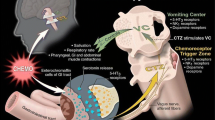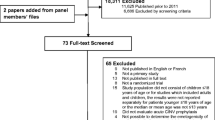Abstract
Only a few studies have been carried out specifically on the prevention of nausea and vomiting in children receiving chemotherapy. In these patients older antiemetic drugs such as metoclopramide and phenothiazines had moderate efficacy and induced significant side effects, especially marked sedation and extrapyramidal reactions.
In comparative trials the 5-HT3 receptor antagonists have shown better efficacy and tolerability than chlorpromazine or metoclopramide combined with dexamethasone.
The combination of a 5-HT3 receptor antagonist plus dexamethasone is superior to a 5-HT3 receptor antagonist alone and should be the standard antiemetic prophylaxis in all paediatric patients receiving highly or moderately emetogenic chemotherapy.
The optimal dose and scheduling of these antiemetic drugs need to be studied, as well as the antiemetic efficacy, in the prevention of chemotherapy-induced delayed and anticipatory emesis in children.
Similar content being viewed by others
Author information
Authors and Affiliations
Rights and permissions
About this article
Cite this article
Roila, F., Aapro, M. & Stewart, A. Optimal selection of antiemetics in children receiving cancer chemotherapy. Support Care Cancer 6, 215–220 (1998). https://doi.org/10.1007/s005200050156
Issue Date:
DOI: https://doi.org/10.1007/s005200050156




